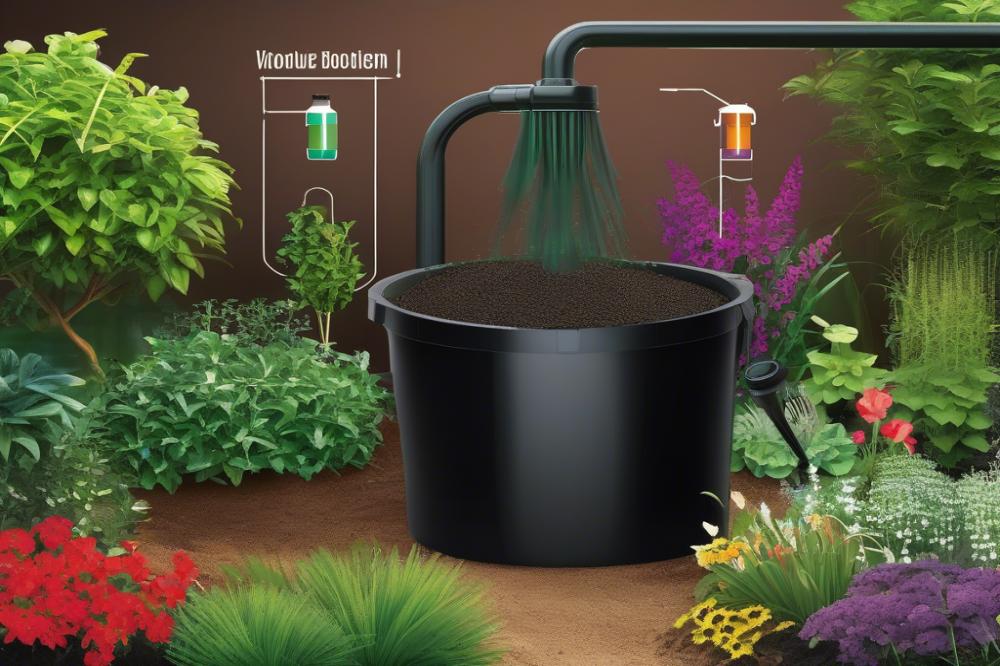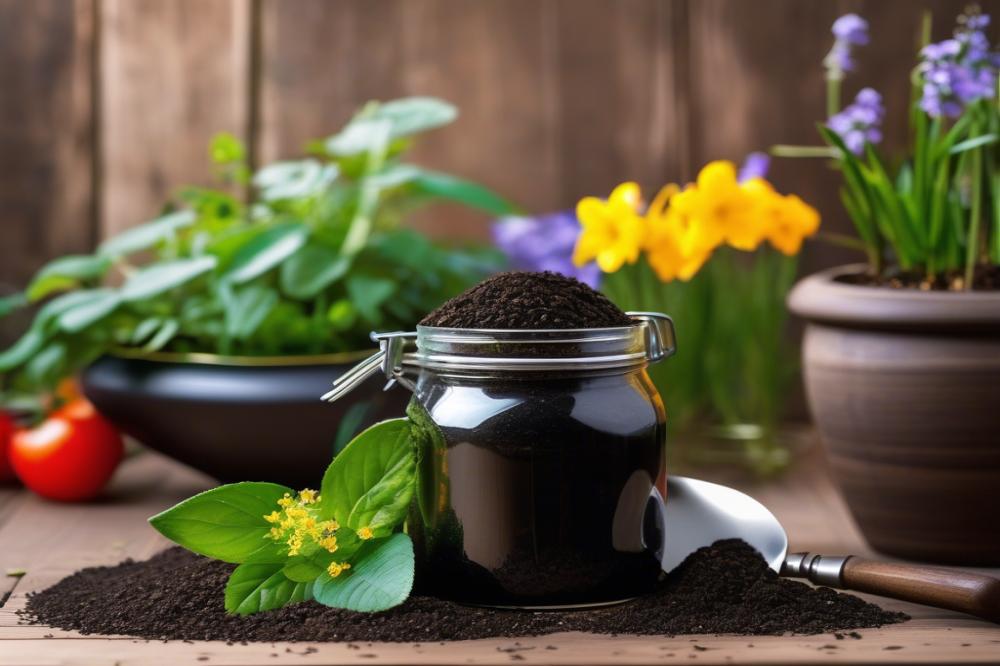The Role of Compost Tea in Strengthening Plant Immunity
In the world of organic gardening, Compost Tea stands out for its role in promoting a healthy garden ecosystem. This liquid gold is made by steeping compost in water, allowing beneficial microorganisms and nutrients to infuse the water. Gardeners often use it as a natural fertilizer, enhancing soil health while encouraging the growth of a thriving soil microbiome. Because it is packed with nutrients, compost tea helps improve plant health and supports overall growth.
Plant Immunity is crucial for vibrant crops and sustainable agriculture. Healthy plants can fend off diseases and pests more effectively. When plants possess strong disease resistance, they require fewer interventions to combat pests and pathogens. This naturally leads to reduced reliance on chemical pesticides. In organic gardening, nurturing plant health takes center stage. The goal is to create a resilient garden that can withstand various environmental challenges. This is where botanical extracts and other organic remedies come into play, complementing the use of compost tea.
By boosting nutrient uptake and encouraging beneficial microorganisms, compost tea enhances the overall health of plants. It plays an important role in crop production by promoting a nutrient-rich environment. Gardeners are increasingly aware of the importance of alternative methods to enhance plant immunity. With this knowledge, they can cultivate robust gardens that align with sustainable practices. Utilizing natural fertilizers like compost tea reduces chemical inputs while promoting a balanced ecosystem.
Ultimately, the integration of compost tea into gardening routines nurtures both plants and soils. As organic gardening continues to gain traction, the significance of strengthening plant immunity cannot be overstated. Cultivating a diverse and resilient environment will pave the way for a more sustainable future in agriculture.
Understanding Compost Tea


Compost tea is a liquid produced by steeping compost in water. This process extracts nutrients, beneficial microorganisms, and other organic compounds. The result is a nutrient-rich solution that promotes plant health.
Creating this brew involves using organic materials like decomposed plant matter, manure, and sometimes even beneficial botanical extracts. By mixing compost with water and allowing it to steep, gardeners can harness the power of organic gardening. The process usually lasts from 24 to 48 hours, depending on the desired strength and microbial content.
Within compost tea, you will find a diverse array of microorganisms. Bacteria, fungi, and protozoa all play crucial roles in boosting plant immunity and disease resistance. These beneficial microorganisms multiply rapidly during brewing. They are essential for enhancing nutrient uptake, which helps plants grow stronger and healthier.
The soil microbiome is another key factor in this equation. Microorganisms in the soil work symbiotically with compost tea to support plants. A robust and diverse soil microbiome enhances the ability of crops to fend off diseases and pests. Furthermore, it contributes to sustainable agriculture practices by reducing the need for chemical fertilizers.
Applying compost tea to plants can lead to improved growth and development. The beneficial organisms present play an important role in nutrient cycling and plant resilience. These natural fertilizers offer a holistic approach to soil health, supporting both microbial life and crops alike.
Organic gardeners appreciate compost tea for its ability to elevate crop production naturally. With various components working together, this solution promotes an environment conducive to healthy plant growth. The integration of compost tea into gardening routines can truly transform the way plants thrive.
Mechanisms of Plant Immunity


Understanding plant immunity is crucial for promoting disease resistance. Plants rely on a complex system to defend against pathogens. This response includes physical barriers and biochemical processes. Healthy plants can better withstand diseases and pests. Strong immunity contributes to overall plant health and successful crop production.
Soil health plays a significant role in this defense system. The soil microbiome harbors a variety of beneficial microorganisms. These microbes can outcompete harmful pathogens, creating a safer environment for plants. They interact with roots, enhancing nutrient uptake and supporting growth. By fostering a thriving community of soil life, gardeners can build a more resilient ecosystem.
In the realm of organic gardening, natural fertilizers are key. Compost tea is one such product that provides essential nutrients while also promoting beneficial microbial activity. Rich in botanical extracts, this tea acts as a powerful ally for plants. These extracts can stimulate the plants’ internal defense mechanisms, allowing them to react more effectively to stressors.
By using compost tea, gardeners can enhance their soil’s nutrient profile. This leads to better nutrient uptake by plants, which is vital for growth and defense. Increased nutrient availability enables stronger plant structures, making it harder for pests to cause damage. Additionally, the diverse array of microorganisms in the tea helps protect plants from disease outbreaks.
The relationship between plants and their environment is deeply interconnected. When plants receive proper nutrients and support, their overall health improves significantly. This holistic approach also aligns with the principles of sustainable agriculture. By prioritizing biological health over synthetic options, gardeners can create systems that are both productive and environmentally friendly.
There is a growing interest in the use of compost tea as a tool for enhancing plant immunity. Many farmers and gardeners are recognizing its benefits. Beyond just feeding plants, it equips them to handle various stressors. As the agricultural community seeks innovative ways to combat diseases, understanding these mechanisms becomes increasingly important.
Role of Beneficial Microorganisms


Beneficial microorganisms play a crucial role in supporting plant health. These tiny organisms are present in compost tea, making it an effective tool for organic gardening. Their relationship with plant roots can enhance nutrient uptake, leading to stronger and more resilient plants.
In the soil microbiome, diverse microorganisms coexist, creating a vibrant ecosystem. This diversity helps plants by breaking down organic matter. As they do, they release nutrients that are vital for growth. Microbes are not just helpers; they form a symbiotic relationship with roots, directly influencing how plants absorb water and nutrients.
Furthermore, these organisms contribute significantly to disease resistance. When beneficial microbes are present, they can outcompete harmful pathogens for space and resources. This natural defense mechanism helps plants fend off diseases that would otherwise weaken them.
Additionally, using natural fertilizers like compost tea can promote the growth of these helpful microbes. In sustainable agriculture, fostering such interactions is key. This relationship allows crops to thrive without relying heavily on chemical inputs.
Botanical extracts can also enhance the activity of these microorganisms, further supporting plant health. By maintaining a healthy soil environment, gardeners can improve crop production. Overall, the role of beneficial microorganisms in reinforcing plant immunity is undeniable.
Using Compost Tea for Optimal Crop Production


In the world of organic gardening, compost tea stands out as a powerful ally. This brew acts like a natural fertilizer and provides a wide range of benefits for plant health. It teems with beneficial microorganisms that help boost disease resistance, enhancing crops’ ability to withstand various threats. To get the most out of this method, proper brewing and application techniques are essential.
Best Practices for Brewing and Applying
Crafting compost tea requires attention to detail. Start with high-quality compost that is rich in organic matter. Aerating the mixture introduces oxygen, promoting the growth of beneficial bacteria and fungi. Using a breathable bag, strain the tea after brewing it for 24 to 48 hours. Timing is crucial; apply the tea during the cool parts of the day, preferably in the morning or evening, to prevent evaporation.
Spread the prepared tea evenly around the base of your plants. Targeting the soil helps improve nutrient uptake. Foliar application can also benefit plants by allowing nutrients to enter through the leaves. Regular applications during the growing season can significantly enhance crop production.
How It Promotes Overall Plant Health
This liquid gold does more than just nourish; it nurtures the soil microbiome. A healthy soil ecosystem encourages the growth of beneficial microorganisms. These tiny allies help in breaking down nutrients, making them more accessible to plants. The presence of diverse microbes creates a balanced environment, leading to improved overall plant health.
Integration into Sustainable Agriculture Practices
Using compost tea fits seamlessly into sustainable agriculture. It offers a non-toxic way to fertilize crops while enriching the soil. This approach aligns with the principles of organic gardening by minimizing chemical inputs. Botanical extracts within the brew can suppress pathogens and enhance the soil’s nutrient profile.
Nurturing the soil with compost tea also contributes to a more resilient ecosystem. By enhancing the soil’s biodiversity, gardeners can promote long-term sustainability. Fewer chemicals mean healthier soils, stronger plants, and, ultimately, successful crop production. This method creates a foundation for farming that respects nature and enhances productivity.
Efficacy of Compost Tea Compared to Synthetic Remedies
Gardeners often face the choice between compost tea and synthetic pesticides. This decision can impact plant health significantly. Traditional synthetic remedies have been the go-to for years, promising quick fixes with strong results. Nevertheless, they raise concerns about long-term effects on both plants and the environment.
Compost tea serves as a more holistic alternative. It not only aids in disease resistance but also enriches the soil microbiome. By boosting beneficial microorganisms, it enhances nutrient uptake in plants. These microorganisms help in breaking down organic matter, ensuring a healthier ecosystem in the soil.
In organic gardening, the emphasis lies on using natural fertilizers. Unlike many synthetic options that can harm surrounding flora and fauna, compost tea promotes biodiversity. Sustainable agriculture thrives on practices that protect the environment. Beneficial microorganisms found in compost tea can help strengthen plants against diseases long before symptoms appear.
In contrast, synthetic treatments often contain harsh chemicals. These substances can lead to chemical buildup in the soil and negatively affect local wildlife. Furthermore, they may contribute to pest resistance, making it even harder to handle infestations over time. Relying on synthetic substances can threaten future crop production.
Botanical extracts have shown promise, but they come with their own drawbacks. Many are costly and may not always be accessible to the average gardener. Compost tea offers a cost-effective solution by utilizing kitchen scraps and garden waste. This makes it an attractive option for those looking to strengthen their gardens sustainably.
Ultimately, the preference for compost tea highlights a growing awareness of environmental sustainability. As more gardeners explore the benefits of natural solutions, the tides are turning against traditional synthetic pesticides. Embracing compost tea reflects a shift towards a more responsible approach to gardening.
Case Studies and Research Findings
Numerous research studies have examined the benefits of compost tea in promoting plant health. Findings consistently show that this liquid gold enhances the soil microbiome. Healthy soil leads to stronger plants, better able to withstand diseases. One study conducted at a university demonstrated an increase in disease resistance among crops treated with compost tea. Researchers noted that the presence of beneficial microorganisms played a key role in this outcome.
In organic gardening, gardeners often report noticeable improvements after using compost tea. For instance, a community garden in Oregon implemented a tea program. Over the season, tomatoes grown with compost tea showed higher yields compared to those treated with standard fertilizers. Local gardeners praised the natural feed, noting better nutrient uptake in their crops. They observed vibrant growth and minimal pest problems, further supporting its positive effects.
Crop production in larger farms has benefited from this practice as well. One California farm switched to compost tea to promote sustainable agriculture. The results were impressive. They experienced reduced reliance on chemical inputs, leading to healthier ecosystems. Testimonials from the farm’s manager highlighted how this practice not only improved soil conditions but also led to a thriving environment for beneficial microorganisms.
Many gardeners advocate for compost tea as a vital part of their organic gardening toolkit. One home gardener shared that using botanical extracts in their homemade tea has significantly boosted plant health. This enthusiasm is common, as many find it aligns perfectly with their desire for natural fertilizers. Furthermore, the approach does not just help individual gardens but contributes to the broader movement of sustainable agriculture.
In summary, research and real-world applications provide robust support for the effectiveness of compost tea. The dialogue around its use continues to grow, encouraging more people to explore its benefits. By strengthening plants and promoting healthy soil ecosystems, compost tea remains a crucial player in organic gardening today.
Final Thoughts on Compost Tea and Plant Immunity
The advantages of using compost tea in gardening are clear. This natural brew promotes plant health by enhancing immunity against various diseases and pests. Healthy plants can resist stress factors better, leading to stronger growth. When gardeners incorporate this method, they contribute not only to their own gardens but to the broader ecosystem.
Organic gardeners are encouraged to make compost tea a regular part of their routine. The process is simple and can yield significant benefits. By fostering a thriving soil microbiome, plants can absorb nutrients more effectively. This relationship is vital in promoting resilience, which is crucial in today’s changing climate.
Looking ahead, the future of compost tea in agriculture seems promising. As more people embrace sustainable practices, this method will likely gain popularity. Awareness around natural alternatives to chemical fertilizers and pesticides is increasing. Many are discovering the unique role that compost tea can play in creating a healthier agricultural landscape.
In summary, embracing compost tea offers a path toward enhanced plant immunity and sustainability. It is an effective solution for those seeking to promote optimal gardening practices. Through simple changes, all gardeners can cultivate a better future for their plants and the environment.



